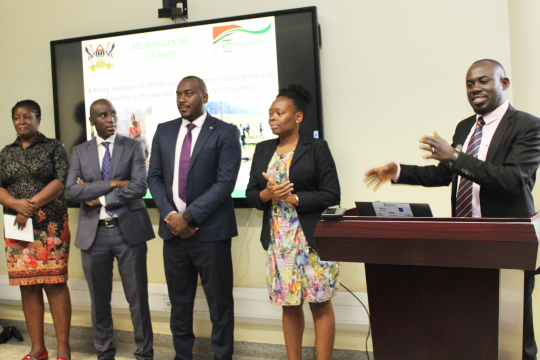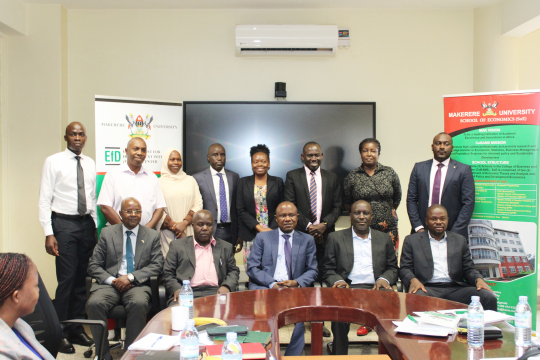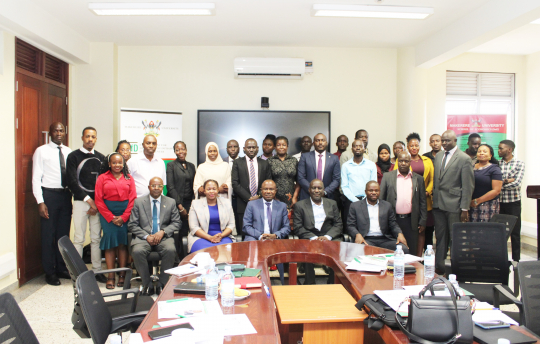Uganda’s participants in the Inclusive Green Economy (IGE) in practice program 2023/24 have been introduced at a function held at Makerere University. This cohort will focus on the problems related to biomass dependency, with the theme “Sustainable Energy Transitions”.
A policy dialogue on “The Dangers of Biomass Utilisation and Adoption to Renewable Clean Energy in Uganda” was part of the inaugural activities, Up to 90% of Uganda’s energy is based on biomass while in the rural areas, up to 100% of the energy used is from biomass.
Certain biomass like charcoal is, argued the Principal of the College of Business and Management Sciences, Eria Hisali, not only unsustainable but an existential threat causing the environmental degradation seen in climate change.
Uganda’s IGE Cohort 2023 is composed of six fellows who were appointed by the permanent secretaries from government ministries and agencies in response to the letter from the EfDMak center and the Swedish Ambassador to Uganda.
They are; Ssekitoleko Simon Peter (Assistant Commissioner) and Tony Joshua Mwesigwa (Economist) from the Ministry of Energy and Mineral Development; Kandwanaho Jonan (Senior Planner Chemical Industries) and Kebirunge Elizabeth (Planner, Natural Resources and Environment) from the National Planning Authority; Paul Byamugisha (Senior Climate Finance Officer) and Flavia Namagembe (Climate Finance Officer) from the newly established Climate Change Financing Unit, Ministry of Finance, Planning and Economic Development.
“IGE Fellows are foot soldiers in the policy space”
The Dean of the School of Economics, Ibrahim Okumu, decried the massive loss of forestry cover in Uganda. He described biomass as central to the existence of mankind as well as a threat to livelihood.
“Our interest in engaging the IGE fellows is to ensure that we can visibly and with real impact have our foothold into policy space and indeed IGE fellows are our foot soldiers in that policy space”, He said.
The IGE Engagement Specialist Peter Babyenda said the reliance on biomass energy is a key global challenge towards environmental protection and reversing climate change effects.
Globally over 3 billion people rely on biomass energy to meet their energy requirements while in Sub-Saharan Africa, over 900 million people mainly rely on biomass fuels for cooking.
“In Uganda, over 85% of the population use firewood, and 13% use charcoal for cooking. An additional 2.3 million tons of tree biomass is consumed in brick making and by educational institutions, among others,” said Peter Babyenda.
Participants speak out
The Coordinator of Forestry Resources Utilization at the National Forestry Authority Maxwell Kabi said 70% of forests are on private land while 30% are on central forest reserves owned by the government.
“There is a need to support and incentivize land owners to plant more trees and not only to cut them,” he suggested.
The Energy Officer from the Renewable Energy Department in the Ministry of Energy and Mineral Development Michael Ahimbisibwe said many trees are cut by people on their private land where the big portion of Uganda’s forests exist.
People cutting trees decide to change their land use turning them into farmlands, buildings, or rearing animals, and often invite mobile charcoal makers to burn them.
He argued that even if charcoal and firewood use was stopped, the problem of deforestation would still go on without a holistic solution. He asserted that charcoal and firewood users are wrongly targeted because many people use off-cuts and rotten wood.
“Forestry is a big employer but the industry is highly informal. We need the charcoal industry to be formalized,” he suggested.
The Manager of Production, Trade, and Tourism at the National Planning Authority Ronald Kaggwa said the use of biomass is not the problem, but a sustainable use of it that must be developed.
Many industrialized countries are according to Kaggwa exporting and importing charcoal.
“The biomass industry can be turned into renewable energy and used for social transformation,” said Ronald Kaggwa.
“We need public investment in the biomass industry beyond policies. Industries like sugar processing, brick making, and bakeries need biomass. They create jobs and contribute to household incomes.
See additional reporting by clicking on the links below:
https://news.mak.ac.ug/2023/07/ugandas-ige-fellows-2023-inaugurated-cha…
https://www.newvision.co.ug/category/news/charcoal-firewood-use-not-mai…
By: Jane Anyango, EfD Uganda


